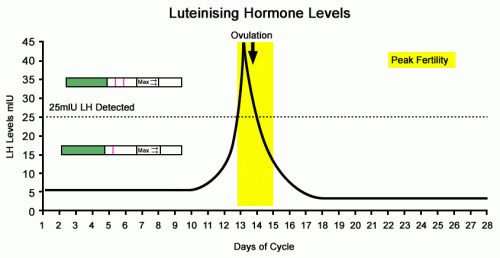 If you and your partner are planning to begin a family, the optimal time to conceive would be when you are ovulating – a process when your ovary releases an egg. This physiological event occurs when ahormone called luteinizing hormone (LH) from the pituitary gland suddenly increases and is released into your bloodstream, triggering your ovary to release an egg.
If you and your partner are planning to begin a family, the optimal time to conceive would be when you are ovulating – a process when your ovary releases an egg. This physiological event occurs when ahormone called luteinizing hormone (LH) from the pituitary gland suddenly increases and is released into your bloodstream, triggering your ovary to release an egg.
A sudden rush of luteinizing hormone from the brain (LH surge) signals the ovary that a mature egg (follicle) is ready to be released. This maturing egg is also producing increasing levels of estrogen. Increased LH levels result in the thinning of the follicle sac which surrounds the egg and allows it to be released.
When Does LH Surge Occur?
Women who have regular cycles usually have the surge between the 12th and 16th days of the cycle. Using an ovulation kit around noon time helps predict this period, which yields a positive result. However, some women have irregular cycles and negative results are often seen when this ovulation kit is used. Consultation with a doctor may be needed to help find out the timing of surge.
A positive result signals “window of opportunity,” which means that fertilization is likely to occur in the next 24-48 hours.
How Long Does LH Surge Last?
The test requires a woman to urinate on a stick beginning on the 10th day of her menstrual cycle. She continues to do this daily until she gets a positive result, which means that the LH levels have increased. If sexual intercourse occurs during the next 36 hours, the possibility of conception is increased. But how long does the LH surge last? Its peak time may last from 12 to 24 hours, but you have to do the test around mid-afternoon to get the best chance of catching the surge.
Note that small amounts of LH may be present in the blood and urine all the time. However, just before ovulation, this amount surges up to five times the usual amount. The following 12 to 36 hours is the time when an egg is usually released and it is when a woman is most fertile.
Note:
- To increase your chances of conception, lovemaking should start on the day you first get a positive result, and during the next three days.
- The pituitary gland produces LH in the morning, so you should test your urine sample in the afternoon or evening.
- It is recommended that you hold your urine for about 4 hours before taking a urine sample.
- The LH surge is short and sudden, so some women test twice a day.
- Follow instructions by testing daily as required. Women who have a regular 28-day cycle should begin testing beginning on day 10 or 11 of their cycle. Women who have cycles with different lengths will need to start testing on different days of the cycle.
- Take note that an egg has a very short time to unite with the sperm (about 12 hours), after which your fertility rapidly declines.
More Things You Should Know About Taking LH Surge Test
-
Can I Receive a Positive LH Test Result and Not Ovulate?
The LH test is highly reliable and accurate in predicting ovulation. Although it is technically possible to have a surge but not ovulate, this is rare. Ultrasonography can be used to verify ovulation. Another way to predict ovulation is to use a fertility chart and a basal thermometer. A rise in basal body temperature takes place after ovulation and can help predict fertility. Learn how to know when you are ovulating here.
-
Can I Receive a Negative LH Test Result and Still Ovulate?
How long does LH surge last? Since the surge is sudden and quick, it is possible to get a negative result even when ovulation has occurred. To ensure the reliability and accuracy of tests, try to follow instruction more closely. Avoid using the first morning urine. If you have very irregular cycles, consider using an ovulation microscope. Or you can use the ovulation calculator to predict when you ovulate here.
-
How Accurate Is It?
Home kits that test for the surge based on urine tests are the best method of predicting ovulation, but they are not foolproof. That is because it can occur with or without an egg being released (though this is rare). Therefore, these kits must never be used as a family planning method for contraception.

